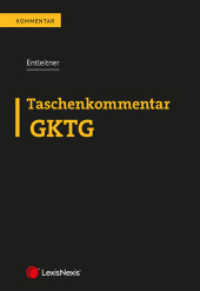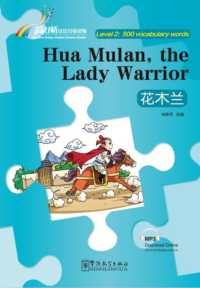Full Description
Following closely behind the global pandemic's recent forced challenges to schools and teachers, Xu gives an overview of how educational researchers and schools in Asia respond to challenges in times of change.
Her research focuses on how they adjust or change curriculum policy and practice to find a balance between developing innovation in response to fast-changing societal needs and maintaining the existing education systems that traditionally predict success for students. In this book, curriculum innovation is documented in three themes: 21st-century skills and competency-based curriculum, technology-supported curriculum and equity in curriculum. Xu includes three types of chapters: (1) case studies that provide detailed analyses of curriculum innovation at the school or country level, (2) conceptual analyses that deepen our understanding of curriculum issues using a new lens and (3) literature reviews that provide an overview of research in particular topics.
The volume will be of great interest to researchers and educators interested in the role of curriculum innovation in times of change. In particular, it focuses on the ways innovative curriculum provides opportunities for individual students to maximize their potential while also acknowledging the constraints of local education systems.
Contents
1. Curriculum innovation in East Asian schools: An introduction Part 1: Competence-based curriculum 2. Project-based and problem-based learning in mainland Chinese schools 3. Singapore's 21st-century competencies through the complexity lens 4. Exploring the relationship between the implementation of a junior secondary Chinese History curriculum and the cultivation of students' civic consciousness 5. Big ideas in the Mathematics curriculum: Critical characteristics and teaching principles in an Asian educational context 6. Chinese Physical Education student teachers' knowledge of self-regulated learning Part 2: Technology in curriculum 7. STREAM education as an innovative niche to cultivate humanistic values: A school-based curriculum exemplar in Hong Kong 8. Teachers' perceptions of integrating digital technologies into formative assessment: Evidence from a medical university in mainland China 9. Digital divide in students' online learning during the COVID-19 pandemic: A case study of Hong Kong Part 3: Equity in curriculum 10. Changes in schools under the "double reduction" policy in mainland China 11. The promise of the school curriculum for every student - A self-determination theory perspective 12. Towards a "caring" curriculum: Promoting cultural equity in preservice teacher education 13. Affective-related content in the Chinese mathematics curriculum: A comprehensive review of syllabus changes in compulsory education in mainland China 14. Curriculum for the future in East Asia: Issues and prospects








